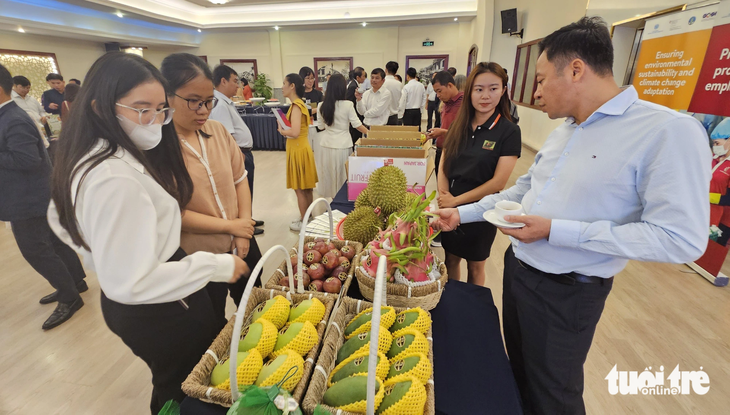Vietnamese authorities should take stricter measures to ensure better compliance by farm produce exporters and producers with quality requirements of international markets, so as to maintain and promote agricultural shipments in the future, experts said at a recent seminar.
The event was organized by the Ministry of Agriculture and Rural Development (MARD) in coordination with the United Nations Industrial Development Organization (UNIDO) in Ho Chi Minh City on Tuesday, centered around improving capacity and compliance with quality standards to promote Vietnam’s fruit exports.
Le Thi Thanh Thao, UNIDO representative in Vietnam, said agricultural exporters in developing countries still face challenges in meeting and complying with EU requirements for international markets.
Specifically, prolonged procedures for or refusal of Vietnamese exports at a number of ports in the past due to non-compliance with the importing countries’ regulations have led to great losses for both farm produce exporters and producers, Thao said.
Dang Phuc Nguyen, general secretary of the Vietnam Fruit and Vegetables Association, told Tuoi Tre (Youth) newspaper that China and other countries have repeatedly warned about quality violations for Vietnamese fruit exports but competent agencies have yet to handle such violations strictly.
“Vietnamese government agencies should apply stronger penalties such as suspending or even banning violators from exporting their agricultural items. In Thailand, many similar violations can lead to prosecution and imprisonment, so the country has lower violation rates than Vietnam,” Nguyen said.
Many experts also called for the agriculture sector to pay more attention to improving farm produce traceability to enhance the transparency of origin.
“In addition to meeting standards on farm produce quality and safety, our factories in the coming time should ensure green environment factors to meet the importing countries’ more stringent requirements on living and working environment quality,” Le Thanh Hoa, deputy director of the Department of Quality, Processing, and Market Development under MARD, told the seminar.
According to UNIDO, the total number of rejection cases of vegetables, edible bulbs, tubers, and roots exported from Vietnam to Australia, China, the EU, Japan, and the U.S. surged to 75 cases in 2020 from 11 in 2012.
Shipments of food and animal feed being rejected in the five markets shrank in 2010-20, to 537 from 632 cases, Baharamakian Nima, manager of a UNIDO quality and standard project, told the seminar.
Statistics show that the Chinese and U.S. markets have the largest rejection rates with 35 percent and 31 percent, respectively, while the EU market accounts for nearly one-fifth of the total number of rejected cases of Vietnam’s exports with the HS code 07 (vegetables).
The main reasons for the rejections of Vietnam’s agricultural exports in 2020 include bacterial contamination (22 percent), unsatisfactory hygiene conditions (18 percent), veterinary drug residues (13 percent), improper labeling (14 percent), and excessive pesticide residues (10 percent), Nima elaborated.
Vietnam needs to strengthen its capacity in assessment techniques as well as safety and hygiene control to conform to international regulations, the project manager said, adding that training and support should be given to producers and exporters to meet international standards such as Global GAP, ISO 22000, and HACCP.
Vietnam’s fruit export growth rate over the past five years has reached 10-15 percent per year, with dragon fruits, mangoes, jackfruits, and bananas being the four items making up 85 percent of the fresh fruit shipments.
In the first seven months of this year, jackfruits generated the highest export turnover, at US$1.1 billion, which is expected to rise to $1.7 billion by the year-end, according to the agricultural sector.
Like us on Facebook or follow us on Twitter to get the latest news about Vietnam!



















































